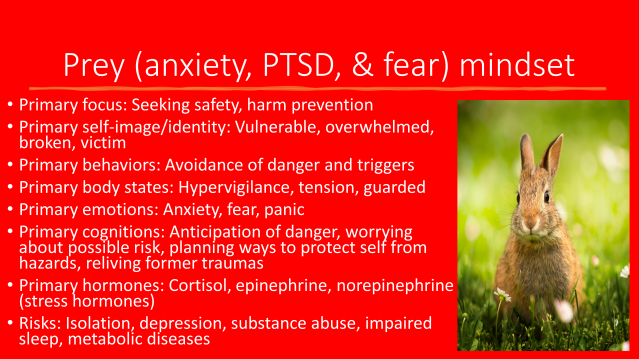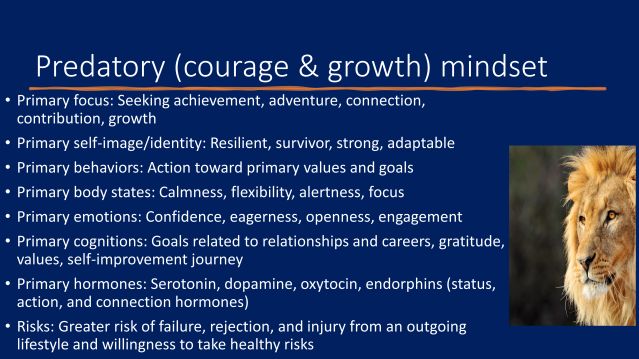TRAUMA- From Prey to Predator: The Mindset of Trauma Recovery. Human nature is cautious, cowardly, and courageous. Here is why. Reviewed by Michelle Quirk

KEY POINTS-
- Adversity remains a common part of modern life.
- Poor mental health includes profound physical, functional, and emotional characteristics seen in prey animals.
- Good mental health requires replacing the prey mindset with an alternative promoting strength and confidence.
Why are humans so vulnerable to developing chronic anxiety, depression, and posttraumatic stress? Despite our unrivaled position at the top of the physical and intellectual food chains, independent of staggering improvements in technology, poverty, life expectancy, and educational equality over the past half-century,1 and irrespective of life resuming a welcome sense of normalcy after the COVID-19 pandemic, objective indicators suggest that mental health among Americans keeps getting worse.2

Some will rightly argue that—despite the above advantages and positive social and public health changes—there remain traumatic events and other serious misfortunes aplenty to explain our growing mental health problems.3 This group might claim that, although no longer quite so "nasty, brutish, and short" as in Hobbesian times, modern life is no less difficult. Similarly, most would probably agree that the enormous merits of technological progress came at the steep price of future uncertainty. Even the wisest counselor can no longer prepare people for the coming whirlwind of unpredictable changes in the years ahead. Facing this unique combination of modern hardships and chaotic futures, perhaps unparalleled societal rates of anxiety, depression, and stress are the appropriate reaction?
The mindsets and emotions of prey and predators
Another explanation for our continuing mental health maladies exists, however. This hypothesis is much older and grounded in human evolutionary theory. Furthermore, in contrast to the discouraging perspectives offered by the above accounts, this third explanation also offers a practical path forward toward improving our emotional health even in the face of continued adversity.
In his best-selling book, Sapiens,4 the author (historian and professor, Yuval Harari) suggests that the modern human predilection toward negative emotions may have resulted from the eons in which our anthropological ancestors lived as lower- to middle-of-the-food-chain organisms. Until very recently by evolutionary timetables, Homo sapiens and their predecessors lived as both prey and predator. These hazardous conditions strongly shaped our evolutionary path to today, not just in ways physical but also emotional and behavioral.

Survey the emotional architecture of the animal kingdom and you will observe a consistent correlation between the species' disposition to emotions such as fear and anxiety and their exposure to predation. Simply put, prey animals (e.g., rabbits, deer, zebras, squirrels) experience frequent anxious emotions, anxious behaviors (e.g., fleeing, freezing, hypervigilance), and anxiety-related neurohormonal function. For them, danger is ever present, potentially severe, and demanding of vigilance and rapid responses (See Figure 1 above). It requires no formal scientific training to see these same traits in abundance among humans.

But humans also share emotional, behavioral, and neurohormonal similarities with apex predator animals such as lions, sharks, and bears (see Figure 2 above). These latter species evolved largely immune from threats from other animals for millions of years, enabling the biological machinery behind their commonly observed courage, aloofness from danger, and calmness amidst calamity. It is in their nature to place rewards above risks and the pursuit of goals above the fear of pain.
Emotional and treatment implications for us
This is where our emotional vulnerability reveals itself and our potential for heroism shines through. Unlike biologically fixed prey animals and apex predators, we evolved between the fray, developing the emotional and behavioral capacities of both ends of the animal spectrum.
On one hand, our latent prey traits make us highly susceptible to adverse events that activate our native capacities for anxiety and trauma. Mental health clinics, recovery programs, and even prisons teem with the results of negative experiences capitalizing on the weaknesses hardwired in our emotional biology.
Yet the same adverse events sometimes also unlock remarkable character strengths and adaptability by unlocking the opposite capacities of the human spirit. These capacities are equally hardwired into our neurohormonal machinery, simply waiting for the opportunity to activate.
Part of a successful treatment result for trauma sufferers, for example, is the person having growth experiences that allow them to enjoy new positive feelings and engage in new goal-oriented behaviors. These latter abilities were always present in the person, needing only the right circumstances to energize their instincts for courage and change instead of the instincts for fear and avoidance. From this perspective, effective treatments and other healing journeys aren't so much changing the person as activating different circuits inside them.
From the same experiences, we can break or grow. Despair or persist. Become villains or heroes. We all possess the biological aptitude for both outcomes. You can thank Mother Nature for that.
- Questions and Answers
- Opinion
- Motivational and Inspiring Story
- Technology
- Live and Let live
- Focus
- Geopolitics
- Military-Arms/Equipment
- Security
- Economy
- Beasts of Nations
- Machine Tools-The “Mother Industry”
- Art
- Causes
- Crafts
- Dance
- Drinks
- Film/Movie
- Fitness
- Food
- Games
- Gardening
- Health
- Home
- Literature
- Music
- Networking
- Other
- Party
- Religion
- Shopping
- Sports
- Theater
- Health and Wellness
- News
- Culture

